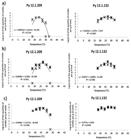ABSTRACT:
Wheat blast is known for developing itself more intensely under relatively high temperature conditions but many aspects related to its epidemiology remain unknown. The objective of this research was to evaluate the sporulative capacity of Pyricularia oryzae Triticum (Pot), the causal agent of wheat blast, in tissues of wheat plants under different temperatures degrees. Wheat plants of the cultivar Anahuac 75, susceptible to blast, were inoculated in the stage of flowering with conidial suspensions (105 conidia/mL) of the Pot isolates Py 12.1.209 and Py 12.1.132. Seven days after the inoculation, plants were cut in the following segments: leaves, stems and rachis (with blast severity ranging from 40 to 60%). Groups of each one of the three plant segments with the lesions were disposed in Petri-dish moist chambers, that were submitted to six different temperature treatments (18, 21, 24, 27, 30 and 33 °C). The most appropriate model that related the conidia production with temperature was identified in the evaluations conducted with stems. The established equations allowed identifying that the highest production of conidia of Pot occurs between 24 and 27 °C.
Key words:
wheat blast; conidial production; severity; sporulative lesions

 Thumbnail
Thumbnail
